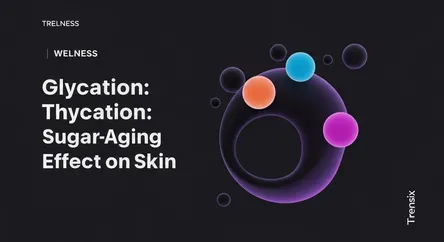Wellness
Glycation: The Sugar-Aging Effect on Skin

Discover how glycation, the process where sugar molecules damage collagen, accelerates skin aging and leads to wrinkles and loss of firmness.
What is it?
Glycation is a natural process where excess sugar molecules in the bloodstream bind to proteins like collagen and elastin. This reaction forms harmful compounds known as Advanced Glycation End Products (AGEs). These AGEs are damaging because they cause the skin's supportive proteins to become stiff, rigid, and weak. Essentially, sugar cross-links with and degrades the very fibers responsible for keeping skin firm and elastic, compromising its underlying structure and ability to self-repair. This process typically begins around age 20 and intensifies over time.
Why is it trending?
There is growing consumer awareness about how lifestyle factors, particularly diet, impact skin aging beyond just sun exposure. The direct link between high sugar consumption and premature wrinkles has made "sugar sag" a prominent topic in wellness and beauty circles. As a result, the skincare industry is increasingly focusing on "anti-glycation" strategies. Brands are launching targeted products with ingredients like antioxidants and peptides designed to inhibit the formation of AGEs, tapping into a demand for more holistic and science-backed approaches to maintaining youthful skin.
How does it affect people?
Glycation accelerates the visible signs of skin aging. It leads to the formation of fine lines and deep wrinkles, a loss of elasticity causing skin to sag, and a dull, sometimes yellowish, complexion. The accumulation of AGEs can also trigger inflammation and oxidative stress, further damaging the skin. This damage impairs the skin’s protective barrier, which can result in dryness, irritation, and increased sensitivity. People can mitigate these effects by reducing their intake of sugar and processed foods, using broad-spectrum sunscreen daily, and incorporating antioxidant-rich skincare.